If Herod were charged in the trial of the slaughter of the innocents, the prosecutor would be hard to crack. He would have one witness and a poor accused's opinion. Defense would be better prepared. Could a conviction be obtained in this circumstantial trial?
The account of Matthew the Evangelist, the only witness to the prosecution in this trial, is well known. In the translation of the Millennium Bible, it reads like this:
Then Herod, seeing that the Magi had failed him, became enraged. He sent [the tormentors] to Bethlehem and the whole area and ordered all boys up to two years old to be killed, according to the time he heard about from the Magi.
How many victims were there? Later authors deliberately tried to shock the audience. Saint Jerome wrote about multa parvulorum milia , that is, about many thousands - others gave details:14,000, 61,000, and the ninth century French monk Usuard outpaced all with 144,000 butchered babies .
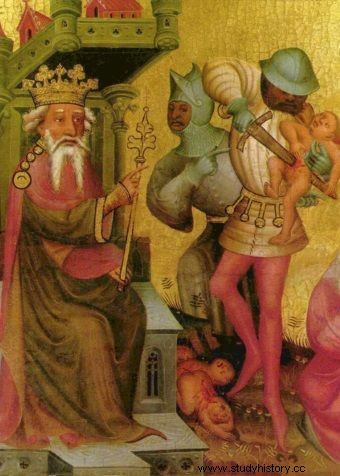
Herod's soldiers must have waved off if there were one hundred and forty thousand innocents ...
A few innocents or tens of thousands?
For comparison, in 2003, 351,000 children were born in Poland. And yet we are talking all the time about Bethlehem and the surrounding area, which is something at best with a territory as large as half a county!
At the end of the 1st century B.C.E. According to some researchers, Bethlehem had 1,000 inhabitants, others, such as W. F. Albright and C. S. Mann, go down as much as 300. How many boys up to two years of age could have been there, taking into account the high infant mortality rate typical of those times? Estimates range from 6-7 to around 20-30 "innocents".
Jesus of Nazareth as Snow White
The English researcher Richard T. France points out that stories about great people who were "hunted" in their childhood are not uncommon. And there is absolutely nothing original about the slaughter of the innocents. The Akkadian king Sargon (died around 2279 BCE), his mother let go in a basket along the Euphrates River, similarly begins the story of the biblical Moses, who survived the slaughter of Jewish boys organized by the evil pharaoh. Cyrus the Great, king of Persia, had to be replaced with a dead baby, because his own grandfather wanted to kill him (he learned from a prophecy that the baby would rule the world - sounds familiar?).
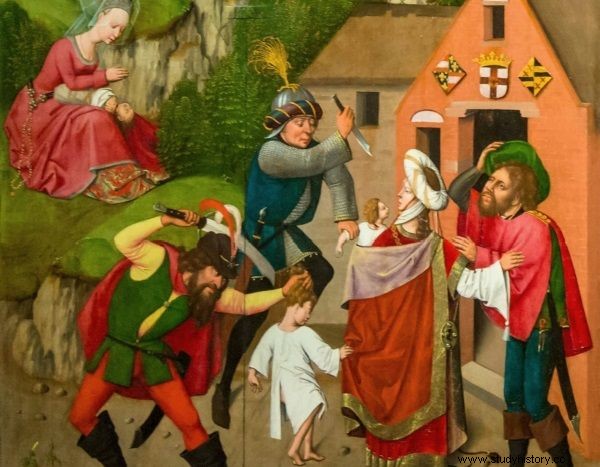
There were surprisingly many similar stories…
France uses not only historical and mythological examples. She even mentions Snow White, whom her evil stepmother decided to kill, aware of her destiny.
There are also stories about rulers who were miraculously saved in their youth. Both real and completely made up. And this is how the French king Jan I the Grave (born 1316) was to survive, being swapped with his mother's child.
In turn, the future Polish ruler, Sigismund III Vasa, was born in 1566 and immediately found himself in the target of his deranged uncle Eric XIV, King of Sweden. As Kamil Janicki writes in Ladies of the Golden Age , Scandinavian monarch:
when he heard about the birth of Sigismund, he decided to play the role of the biblical Herod. He announced that his brother's firstborn must die. Everything was ready when Erik's mistress suddenly intervened - Karin Månsdotter, who was watching his moral decline with horror.
Already much closer to us, it was loud about the miraculously saved Anastasia, the daughter of the last Russian Tsar Nicholas II, who in 1918 was to survive the slaughter prepared for her family by the Bolsheviks.
Nothing happens twice?
Richard T. France's arguments clearly work in favor of the defense. However, the sentence of Paul L. Maier should also be quoted. In the article Herod and the Infants of Bethlehem He points out that researchers who see the myth of Moses' birth in the slaughter of the innocents subconsciously assume that nothing happens twice.
Since Jewish children were killed in Egypt, then Jewish children could not fall victim to massacres, so the slaughter of the innocents is a myth. - "I respectfully say that the slaughter of Jewish children during the Holocaust during World War II was not a myth" - concludes the author.
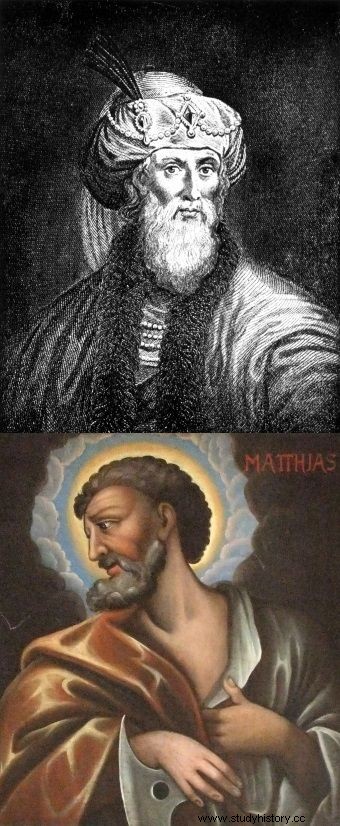
The main witness of the defense, Józef Flavius (top) and the most important witness of the prosecution - Matthew the Evangelist.
Defense witness gives an alibi?
Opponents of the historicity of the biblical account point to the silence of other sources about the slaughter of the innocents, although the only author whose works have survived and who was closely celebrated by Herod the Great was Josephus the Great, born in 37, over forty years after Jesus of Nazareth.
Indeed, in Israel's Ancient History nor did he stumble on the events of Bethlehem. However, this is not the case. First, he might not have seen about them. In describing the reign of Herod, he relied heavily on the writings of Nicholas of Damascus. Meanwhile, this historian was a friend of the King of Judea and omitted facts that were inconvenient for him, as Flavius himself pointed out.
The explanation could be even simpler. It is possible that Flavius heard about the slaughter, but found it not a very interesting anecdote. It was not a hecatomb counted in thousands of victims. If Flavius knew something, it was only that a few, maybe a dozen babies died in the dead-end hole . Probably even the parents of the murdered children did not know what their guilt was. It is doubtful that the wetboys would say, "Good evening, we were sent by Herod because some mages from the East told him that the future king was born in your town - we cannot establish in which family, therefore we will kill all the boys up to two years of age."
Incidentally, it is worth recalling that Flavius wrote for the audience that the Greek and Roman world for whom the life of a child was not of great value. - The Greeks regularly practiced infanticide as a means of birth control, especially in Sparta, meanwhile a Roman father had the right to abandon the child on the doorstep, allowing him to die - points out Paul L. Maier. So why would Flavius bother with a few babies outside Jerusalem?
New prosecution witnesses. Better they stay home
The attempt to find sources other than the Gospel of Matthew, dealing with the Bethlehem slaughter, is a backbreaking task. Two have been dug out, but no serious historian will build arguments on them.
The first is a rather enigmatic mention in the apocrypha entitled Ascension of Moses , according to some, written around 4 B.C.E., shortly after the birth of Jesus of Nazareth. There is a prediction that Herod will kill old and young like the biblical Pharaoh - the same one who had Jewish boys killed in Moses' day. The association is loose and you can see at first glance that the relationship is tight.
The second source is better in terms of the reference, but lame in terms of chronology - because it comes from around 400 . It's Saturnalia Macrobius, where it is mentioned that Herod had all boys under two, including his own son, killed in Syria.
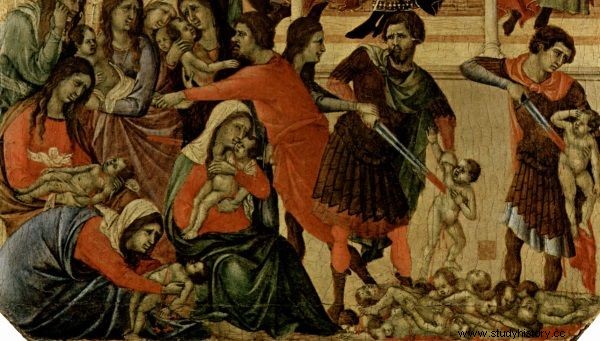
14 victims or one hundred and fourteen thousand?
Two different events were mixed up for the author here, because Herod's sons, killed by their father, Antipater, Alexander and Aristobulus, were adults at the time of his death.
The accused was capable of committing the prohibited act
Often, when discussing the historicity of the slaughter of the innocents, the crimes committed by Herod the Great are enumerated. His three sons appear on the list of victims, his wife, brother-in-law, mother-in-law, grandfather of the wife ... Today it impresses us, but in the ranking of the most brutal ancient rulers, Herod probably would not have made it to the top 20.
Even the Roman emperor Constantine the Great, who gave Christians freedom of religion in the Edict of Milan and was baptized on his deathbed, had a wife and a son on his conscience. More important in the case of King Herod is the paranoia with which he fell during the last years of his reign. It was then that his three sons said goodbye to their lives. He even ordered that a certain group of Jewish dignitaries be murdered after his own death.
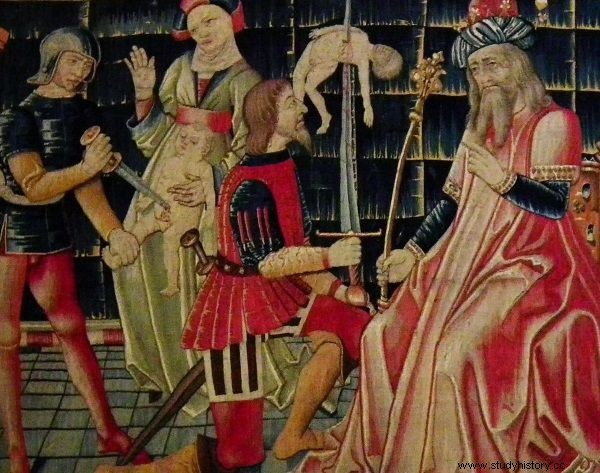
One shashlik with a baby for Your Majesty.
By eliminating uncomfortable malcontents, he wanted to make sure that people would cry for him. In this context, an order to kill a few, a dozen or even several dozen boys seems likely. The more so because Bethlehem was considered to be the hometown of King David and at the same time the cradle of the greatest Hebrew dynasty.
So guilty?
Could a conviction then be given in the case of Herod the Great? If we accuse him of killing 144,000 boys from Bethlehem, definitely not. If we reduce the number of victims to a few or a dozen, the matter will be completely different. Herod would definitely be capable of such a crime. And even his eyelid wouldn't twitch.
Sources:
Among the literature on the subject, two articles have been particularly inspiring and helpful:Richard T. France, Herod and the Children of Bethlehem , "Novum Testamentum", Vol. 21, Fasc. 2 (Apr., 1979), pp. 98-120, and Paul L. Maier, Herod and the Infants of Bethlehem [in:] Chronos, Karios, Chronos II. Chronological, Nativity, and religious studies in memory of Ray Summers , Macon, Ma. 1998, pp. 169-189.
